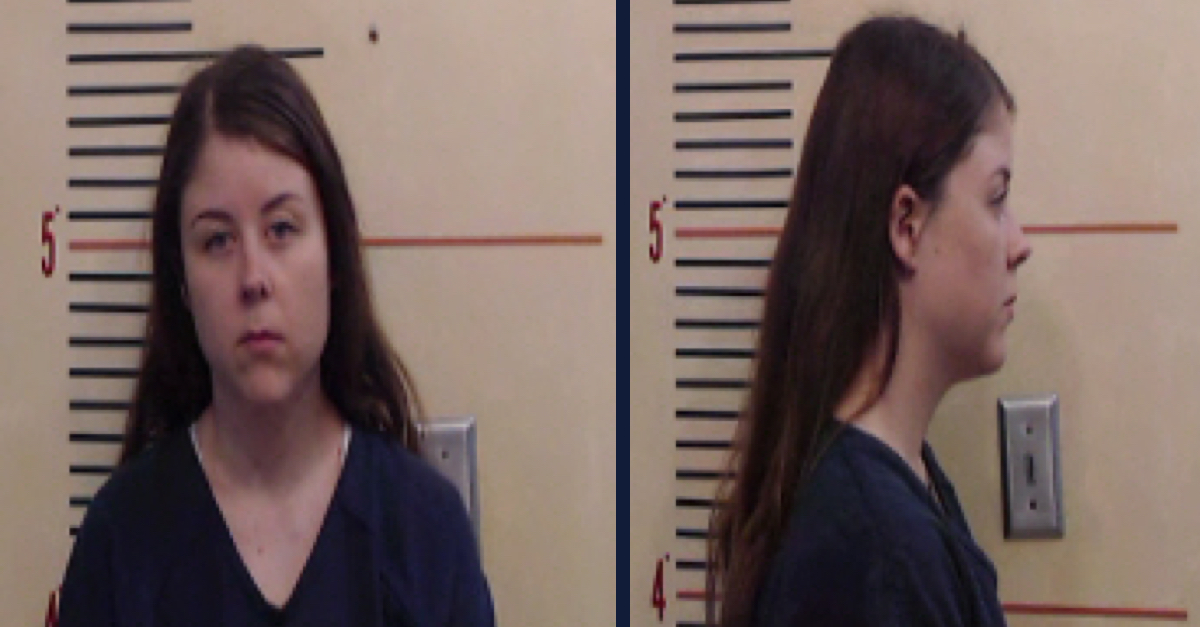
Cala Richardson (via Lake Worth (Texas) Police Department).
A Texas bartender has been arrested after she allegedly “overserved” a man who then got in his car and struck and killed a police detective driving with his family, authorities said.
Cala Richardson, 26, was allegedly behind the bar at a Lake Worth restaurant where Dylan Molina told police he had been drinking on Nov. 21, 2021, before running a red light and slamming his Jeep Wrangler into a Chevrolet Impala being driven by Alex Cervantes.
Cervantes, a detective with the Euless Police Department, was killed. His wife, Priscilla Cervantes, was in a coma for nearly a month after the crash, and their two sons, Joshua and Jake, were also seriously injured.
According to the probable cause affidavit for Richardson’s arrest, a review of security footage and receipts from Fuzzy’s Taco Shop in Lake Worth revealed that the bartender had served Molina eight drinks — each containing a double serving of vodka — in less than three hours. The first drink was served just moments after Molina sat down at the bar at around 10:30 that morning, and the most time that passed between drinks was less than a half-hour.
Detectives saw Molina “enter the Fuzzy’s Taco Shop at approximately 1037 hours and stay for approximately (2) hours and (50) minutes,” the affidavit says. “During this time, Molina is observed seating himself at the first barstool of the restaurant’s bar, ordering and consuming (8) double vodka/Redbull mixed drinks, all served to him by RICHARDSON.”
According to the affidavit, Molina was served his last drink at 1:12 p.m. and started driving at around 1:30 p.m.
By 1:33 p.m., police say, Molina had crashed his Jeep into the Cervantes’ car.
The affidavit says that while at the bar, Molina “attempted to engage the bartender” throughout his nearly three-hour stay.
“After his 7th drink was served at approximately 1254 hours, Molina begins to exhibit common signs of intoxication that included approaching individuals at the bar with a loose, belligerent body posture and hugging and/or touching a customer at the bar that Molina did not appear to be acquainted with,” the document says.
In a police interview months after the crash, Richardson reportedly told police that she wasn’t sure if Molina had actually consumed the seventh vodka Redbull, and she estimated that he had had about six of the drinks during his time at the bar. She also allegedly told investigators that “she had not noticed any indicator of intoxication until the minutes prior to the departure from the bar, primarily when [Molina] had walked through the employee-only area of the bar/establishment.”
Police indicated that even if Richardson didn’t notice Molina acting drunk, she should have known better than to let him leave the bar: her prior training, which is required in order for her to get a license to serve alcohol, includes “recognizing signs of intoxication and the prohibiting of serving intoxicated individuals,” according to the affidavit.
She also should have had “reasonable knowledge of (6) to (8) double alcoholic drinks over a (2)hr (50)min timespan, with only (16)-(29) minutes in between each alcoholic beverage would precipitate the intoxication of an individual,” the affidavit says, adding that her failure to do so amounts to criminal negligence.
After the crash, callers to 911 reported that Molina was “attempting to flee the crash scene on foot,” Lake Worth police said. He was apprehended by police, who “smelled a strong odor of an alcoholic beverage” on his breath.
According to local ABC affiliate WFAA, Molina had also gotten into a minor accident moments before colliding with the Cervantes family.
“During the investigation, Detectives obtained evidence indicating the suspect was overserved by Richardson, who at the time was a bartender at Fuzzy’s Taco Shop in Lake Worth,” a statement from the Lake Worth Police Department said.
“Additional evidence indicated Richardson’s [Texas Alcoholic Beverage Commission] server’s license was expired at the time she served the suspect,” the statement added.
Richardson is charged with one count of Sale to Certain Persons, which Lake Worth police say is a “Class A misdemeanor punishable by up to 1 year in jail and a $4,000 fine.”
Molina pleaded guilty in January to intoxication manslaughter and three charges of intoxication assault. He was sentenced to 15 years in prison for the manslaughter account and 10 years each for the assault charges but will serve only 15 years as the judge ordered the sentences to run concurrently.
According to the Tarrant County District Attorney, the Cervantes family supported the plea agreement. At Molina’s sentencing, Priscilla Cervantes said that her husband “was and forever will be our hero.”
“I hope every day behind bars is pure agony for you,” she told Molina. “I will never forgive you for as long as I live.”
“Like most serious alcohol-related crashes, this case has devastated an entire family,” said Lake Worth Police Chief J.T. Manoushagian. “Today’s arrest fulfills a commitment we made early on – and that was to fully investigate this senseless crime and hold those responsible accountable.”
Sheriff’s records indicate that Richardson was released from custody on a $1,000 bond. It’s unclear whether she has an attorney.
“State law prohibits the sale of alcohol to an intoxicated person,” a spokesperson for the TABC told Law&Crime in an email. “Businesses, as well as their employees may be held accountable in the event of a violation […] TABC’s investigation is to determine whether the business violated the law in allowing a person to be overserved prior to the accident. The misdemeanor case against the server is a separate issue being pursued by Lake Worth PD.”
Editor’s note: This story has been updated to include information from the probable cause affidavit.